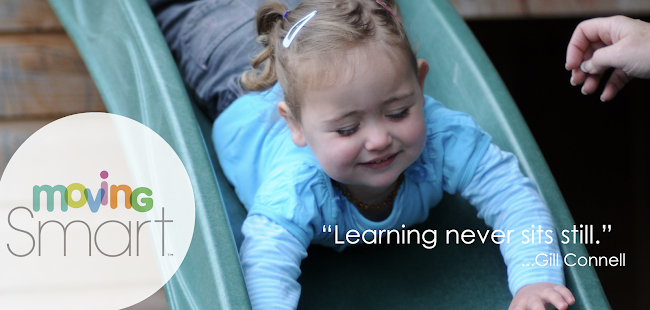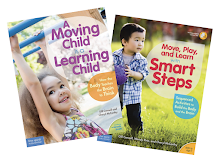Uh oh.
"In a little while," you answer, hoping against hope that this will satisfy her. But like every parent, you already know what's coming... the fidgeting, the fussing, the fooling around, and the falling apart.
You have just entered The Impatient Zone.
WHY ARE KIDS IMPATIENT?
Now, before you allow this to become a test of your patience, know this...
Kids are impatient because "now" is all they know.
You see, without a lot life experience and nascent memory skills, little ones have no real sense of the concept of "past." Without understanding "past" there is no understanding of the more complex concept of "future." Without "future," there is no understanding of waiting. And it's the waiting part that takes patience.
For young children time isn't real because it's not tangible. They can't see it, hear it, taste it, smell it, or touch it. For instance, ask any two year old what she did yesterday and chances are you'll get a blank stare. Ask her if she went to the circus yesterday, and she'll tell you all about it. She remembers the circus. She simply doesn't understand that it happened yesterday.
For time-strapped parents, it's hard to imagine the very thing that rules every minute of your day can be so illusive - so NOT-real - to your child. So let's talk about how time comes into focus for little ones...
HOW KIDS LEARN ABOUT TIME
MAKING IT REAL. Kids learn about time by moving through it. At first it may be noticing the difference between day and night -- light and dark. Next, she may begin to associate time with routine, everyday things. For instance, breakfast, lunch, and dinner are regular, time-based events that make time tangible for her.
LEARNING SEQUENCE. Next comes the idea of the passage of time when she begins to grasp "before" and "after." Putting on your socks before you put on your shoes is the very beginning of sequencing, which will later unlock abstract concepts such as "past" and "future."
TIME MEASUREMENT. Actual increments of time -- seconds, minutes, hours, days, weeks, etc. -- are far more sophisticated concepts that will come to her with experience and language acquisition... dare I say it... over time.
TELLING TIME. And finally, the ability to read the clock will emerge as she begins to recognize and understand numbers and number sequencing, and relating those numbers to the time-based events in her life.
TALKING TIME
Like so many things in a young child's life, time concepts unfold naturally through everyday experiences and the words she hears from you. So choosing your words about time is important. After all, what does "in a minute" mean to a little one who doesn't yet understand how long a minute actually is.
Here are some of the time-based words we use casually in everyday conversation. Try to imagine what these actually mean to your child...
Soon • as soon as • shortly • almost • just about • not long • later • in a second • in a moment • in a minute • in five minutes • in a while • just a minute • not now • until • not until • before • during • while • after • yesterday • today • tomorrow • next week • next month • last week • last month • since • once • never.
Is there any wonder they get impatient?
To help your child get an understanding of time, she has to get a "feel" for it. And one of the things you can do to help that process is to make sure you're saying what you mean. Use time language that is specific, contextual, and descriptive. A few examples...
"I'LL PLAY SOON."
Choose a specific time then set an egg timer, explaining that when it rings, it will be time to play.
"I'LL PLAY LATER."
If you can't be specific, put time in context, such as, "I'll play later, after dinner."
"I'LL PLAY TOMORROW."
When you're not sure your child will understand an abstract time concept, describe it, such as, "After we wake up in the morning, it will be tomorrow and then I'll play with you."
Now, I can't promise you that precision language will keep you out of The Impatient Zone entirely. But a little clarity and lot of patience and understanding on your part may make those trips through "The Zone" easier to navigate.
TIME PROMISES
And one last note. When you say you'll be there "in a minute," be there in a minute. If you show up 10 minutes later, you run the risk of confusing her. She may begin to sense that one minute is 10 times longer than it actually is.
But even more, when you show up when you say you will, you're teaching her the importance of keeping your word.
And on that subject, every minute counts.
And on that subject, every minute counts.
MINUTE MOVES!
SET UP. If you don't have one, I strongly suggest going out and buying an egg timer. Setting the timer and hearing it ring is great sensory reinforcement of time concepts. Alternatively, many smart phones have timer apps already installed, or you could find a few short, one-minute songs your child loves, using them as the timer for these games.
TO PLAY. Set the timer for one minute (or whatever time increment you believe your child can manage), then go have fun! Use the following list as your starting point, then make up your own Minute Moves! But be sure not to make these games competitive. The idea here is to have your child understand what time feels like by playing and moving through time. Enjoy!
How far can you run in a minute?
How much sand can you scoop in your bucket in a minute?
How many times can your roll over in a minute?
How many blocks can you stack in a minute?
Can you hang from the monkeybars for a minute?
Can you wiggle your toes for a minute?
Can you bounce a ball for a minute?
Can you stay still for a minute?
Can you brush your teeth for a minute?
How many kisses can you give mommy in a minute?
















Wow! Great post!! :) Love the explanations, practical advice and all the tips.
ReplyDeleteGreat Read! Thank You!
ReplyDeleteThanks! I love teaching children through life situations!
ReplyDeleteLove this! Brilliant read, thank-you for sharing! Tash xx
ReplyDeleteAh yes... I have been guilty lately of not appreciating how difficult it is for my kids to understand time frames. This is a great post with lots of practical ideas, thanks!
ReplyDeleteThere are some great singing games that parents can play with their kids as well (i.e.: "Swimming Pool" and taking words out while substituting them for gestures). You offered such great ideas! Thank you.
ReplyDeleteBrill, we use our cooker timer the whole time. Great idea to teach them time concepts by timing every day stuff for a minute. An extension of this idea would be to see how long it takes to do something e.g. tidying up, getting dressed etc.
ReplyDeleteWonderful approach to teaching the concept of time to kids. Thanks for these wonderful, mmediately useful tips!
ReplyDeleteExcellent ideas for introducing concepts of time in fun, authentic ways. Thanks!
ReplyDeleteVery practical tips on helping kids understand the concept of time. I will share this with my preschool parents.
ReplyDeleteThis is great. Thanks! We are in the midst of "lets go to the park yesterday"... It's a pretty cute phase, if you don't think about how frustrating it can be;)
ReplyDeleteExcellent points with great ideas for parents! I'm sharing this on my facebook page for parents to see.
ReplyDeleteThank You Gill. Another fantastic post to tweet and share on my facebook wall because the message is so clear and simple and spot on, and just typically brilliant. Love it. x
ReplyDeleteWell done...will pass this along for sure. Thank you!
ReplyDeleteThis is excellent! May I offer another tip? Invest in a Time Timer. You can buy one on Amazon. It is a visual timer. You set a time and the timer shows red. The red disappears as time passes. Teach the child that when the red is gone, time is up. Use it for the examples you named above but also for turn-taking, sitting on the potty, to show how long they can play, how long before they are going somewhere, etc. I have used this with children as young as 2 and it works like a charm.
ReplyDeleteWell said, thanks for the tips! I have two young children (3 and 7). My 7 year old has been having trouble grasping this so we took him to a place that offers tutoring in Los Angeles (we live in California). It has been very helpful but I'd love for my 3 year old to get a head start, I will certainly take your advice to help her learn. Thanks again for sharing.
ReplyDelete